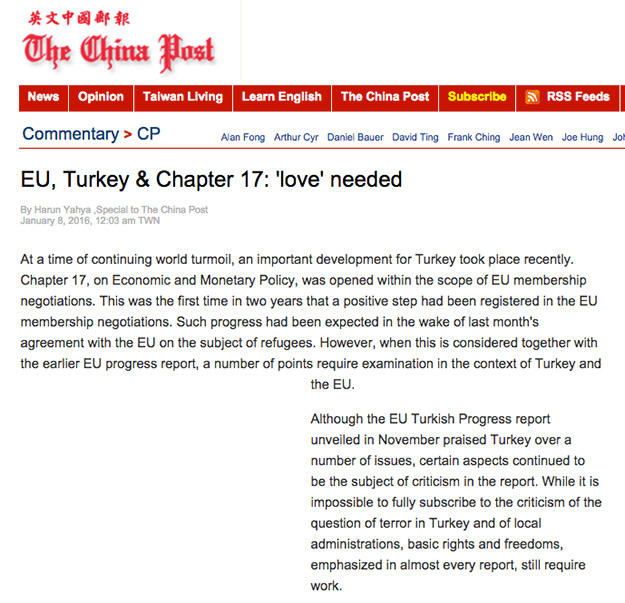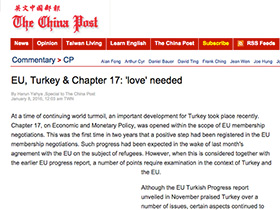
At a time of continuing world turmoil, an important development for Turkey took place recently. Chapter 17, on Economic and Monetary Policy, was opened within the scope of EU membership negotiations. This was the first time in two years that a positive step had been registered in the EU membership negotiations. Such progress had been expected in the wake of last month's agreement with the EU on the subject of refugees. However, when this is considered together with the earlier EU progress report, a number of points require examination in the context of Turkey and the EU.
Although the EU Turkish Progress report unveiled in November praised Turkey over a number of issues, certain aspects continued to be the subject of criticism in the report. While it is impossible to fully subscribe to the criticism of the question of terror in Turkey and of local administrations, basic rights and freedoms, emphasized in almost every report, still require work.
Turkey has made considerable progress in its membership negotiations with the EU, and has certainly made enormous advances on the subject of democracy. However, this progress concerning Turkey and the EU also needs to be evaluated from a different perspective. In addition to being a European country, Turkey is also a gateway to the Middle East. It is an Islamic country with a 90-year, deep-rooted democracy. As an Islamic country it has a responsibility to build the finest democracy possible. That responsibility is even greater at this time when radical terror is spreading and also infiltrating Europe. It needs to show the world, and particularly the Islamic world, that an Islamic country can live by the perfect democracy enshrined by our Prophet (saas) in the Constitution of Medina. At the same time, it must achieve an even higher level of modernity and civilization than Europe with the value it attaches to women, art and science. Pleasing Europe and seeking to achieve the desired norms in negotiations is one way, of course, but Turkey must also do this as a component of its own existence, happiness and responsibility.
Europe is certainly assessing Turkey's candidacy, not only on the basis of EU norms, but also on the basis of its being an Islamic country. This most important factor makes it necessary for Turkey to prove itself more than other countries. The nonsensical way of thinking based on traditions that have entered many Islamic countries has led to Muslims attacking other Muslims in many countries, to a rapid growth in radical thinking and a severe quality deficit. An understanding has declared war on all of Europe's civilized and aesthetic values, and has made its voice heard by way of angry slogans. The fact is, however that no country that restricts freedoms, despises women and relegates art and science to an inferior position can possibly maintain its existential values. It is unsurprising that at a time when much of the Islamic world is so removed from European priorities, and has even declared war on those values, that the EU should be broadening its evaluation criteria when opening its doors to an Islamic country.
It may seem difficult in some people's eyes for Turkey to meet these criteria; yet it is really a quite easy matter. All it needs is a powerful determination. It is also essential to disregard those angry voices. The Turkish government and state must adopt a sound strategy that makes no concessions to the radicals and that will not be affected by criticism and accusations from them. It must keep love and friendship firmly to the fore. Due to its geographic and historic position, Turkey has a number of responsibilities. It needs to discharge these by spreading the idea of love in the Islamic world. What the Middle East needs is for teachers of love to make their presence felt, rather than for new players to appear on the scene. Following the First World War, first Great Britain and France, and then the U.S., entered the Middle East as players, and this inflicted nothing but conflict and disputes on these fine lands. Therefore, the important thing in that the region is to be a friend and brother who wishes to spread the idea of love, rather than showing arrogance to be a player.
This attitude must also be adopted in the approach to Europe. It is essential to eliminate the concerns, based on radicalism, of the peoples of Europe. It is essential to behave in such a way as to make the warmth of Islam felt. Turkey, which is negotiating with the EU, therefore needs to adopt the concept of friendship commanded by the Quran, to embrace all other beliefs and to properly reflect the true warmth of Islam to Europe. In this way, the division between the peoples of Europe and the Islamic world, that has persisted for many years and grown even deeper because of radical terror, must be eliminated, and "love" can become the foundation.
Such powerful change will be of significant benefit not only to Turkey and the Islamic world, but also to the EU. A Europe that becomes acquainted with the warmth of Islam and that begins to lose the "fear" that is spreading now will begin reacquiring such concepts as altruism and friendship. It will seek a solution alongside Muslims to the radical terror it has become acquainted with so frightfully and which it is trying to oppose with false and inappropriate means. As I have always said, the only solution to radical terror, that is spreading through misuse of the word "Islam" and is entirely the product of a spurious belief, is the Quran. Therefore, the fight against terror is only possible with real Muslims capable of providing evidence from the Quran.
Turkey must proceed with the EU negotiations in the knowledge that it is a different country. As an Islamic country it must produce powerful reforms on the subjects of democracy, freedoms, women's rights, art and civilization and must focus more on "love and solidarity," which is what Europe wants to see from the Islamic world, rather than on technical capacities. Turkey needs such reforms, the Islamic world needs such examples and Europe needs such a model of Islam, more than ever before.
Adnan Oktar's piece in The China Post:


